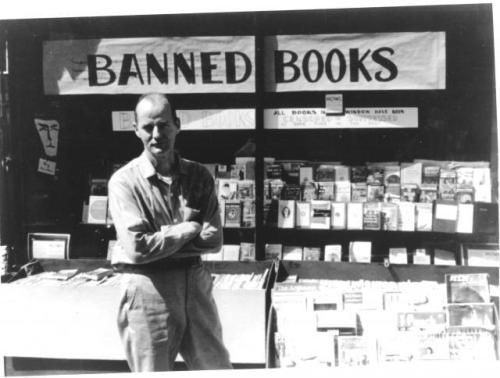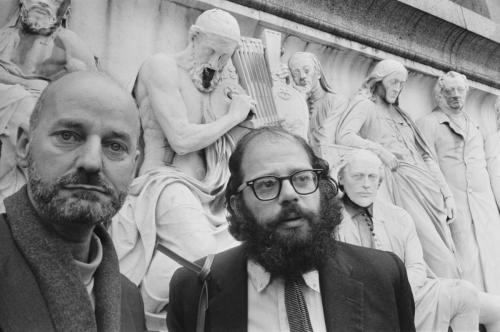#1
Welcome
What are your associations about and/or experiences with Lawrence Ferlinghetti?
#2
Owner of a Bookstore
Spend five minutes browsing the site and notice what you notice.
#3
A Publisher
Allen Ginsberg, HOWL and Other Poems
Allen Ginsberg, Howl: Original Draft Facsimile, Transcript… 50th Anniversary Edition
Ronald K. L. Collins and David M. Skover, The People v. Ferlinghetti: The Fight to Publish Allen Ginsberg’s “Howl”
Bill Morgan and Nancy J. Peters, Howl on Trial: The Battle for Free Expression
Jason Shinder, ”Howl” Fifty Years Later: The Poem That Changed America
Some reflections on Howl—
Ron Collins and David Skover: A poet dared to write a poem condemning the guardians of the societal canon, a publisher dared to print that poem, a bookseller dared to sell and circulate that poem and then defend it in court, a news paper dared rally to the cause of the poet, publisher, and bookseller, and finally a god-fearing judge dared to protect the poem and the publisher in the name of the law.
Allen Ginsberg: I thought I wouldn’t write a poem but just write what I wanted to without fear, let my imagination go, open secrecy, and scribble magic lines from my real mind—sum up my life—something I wouldn’t be able to show anybody, write for my own soul’s ear and a few other golden ears.
Bob Rosenthal: “Howl” is a critique of repressive certitudes that renews hope through candor. The societal hierarchies we have known relentlessly resemble Moloch, embody Moloch, and out-Moloch Moloch. Invariably Moloch has been renewed, and so the poem “Howl” is made new.
Eliot Katz: In part III, the desire for solidarity is made explicit and becomes a model for the sort of collective social effort, or movement building, that could potentially improve human conditions by challenging Moloch’s multilayered rule.
Anne Waldman: It was a cri de coeur, an alarm, a vision. Its structure matched its energy, which seemed the voices of many, not one. It was a rhizomic collage, just like life, a pastiche of the experiences of many others, encompassing flashes of Blake’s “minute particulars.”
#4
A Poet
Lawrence Ferlinghetti
Tall Tale of the Tall Cowboy
How the Great Cowboy rode to the Rio Grande
and gave the President of Mexico a hunting rifle a bad omen
How the Great Cowboy took over from the Great Charmer
who faded away into Georgia to be born again
How they lined up at the Rio Grande to take their stand
How they lined up at the great trough across the land
How they reconquered the West and resettled Washington
How the Metternich of Foggy Bottom
still moved behind the scenes
How they anointed generals to run countries
How they redrew the maps of the known world
How they forgot the barrios North and South
How they lassoed the red lions of Latin America
How the Great Cowboy ruled over all with a schoolboy grin
How his lady had a handgun with a pearl handle
How his tall shadow reached over the Rio Grande
How they gave human rights back to the right rulers
How they gave the land back to the old guarders
How the high rollers got back in the saddles again
How the Great Cowboy shook his head with a sheepish grin
for the benefit of a nation of sheep
How they reversed the irreversible revolutions
How they corralled the tough hombres North and South
How they buffaloed both sides
How they gave them bullets to bite
How they swallowed hard
when the Great Cowboy laughed on TV
How the Great Cowboy waived his hand
and disappeared over the horizon
How he walked softly and carried a big nuke
How he brandished it like a hunting rifle
How the President of Mexico gave him a great stallion
How he tried to mount it as the cameras rolled
How he slung his hunting rifle behind him and swung up
How the people hid in their houses
How the hot sun beat down on the mined land of the world
How the swinging-door saloons stood empty and silent
How the natives were restless and beat their drums
in the concrete jungles of the world
How the Indians said How Come instead of How
How the Indians hid in the hills
How the Great Smiler smiled no more on TV
How he came on his great white stallion
propped up from behind with a big stick
How he stood tall in the saddle
and looked straight into the cameras
How the old hands hid in the old corrals
How the deputies deputized themselves
and took to the roofs
How the people trembled in their houses
How they thought it was the final shoot-out
How a great hush fell upon the plazas of the world
How the Great Cowboy put on one black glove
How his eyes narrowed and his hand reached behind him
How suddenly there was nowhere to hide
How suddenly there was no turning back
How suddenly it was High Noon
***
A Reflection by Maryknoll Father Miguel d’Escoto, former Foreign Minister of Nicaragua
First of all, let me start out by saying that, of course, Reagan is now dead. And I, for one, would like to say only nice things about him. I’m not insensitive to the feelings of many U.S. people mourning President Reagan, but as I pray that God in his infinite mercy and goodness forgives him for having been the butcher of my people, for having been responsible for the deaths of some 50,000 Nicaraguans, we cannot, we should not, ever forget the crimes he committed in the name of what he falsely labeled “freedom and democracy.”
More perhaps than any other U.S. President, Reagan convinced many around the world that the U.S. is a fraud, a big lie. Not only was it not democratic, but, in fact, the greatest enemy of the right of self-determination of peoples. Reagan was known as the “great communicator” and I believe that that is true only if one believes that to be a great communicator means to be a good liar. That he was for sure. He could proclaim the biggest lies without even as much as blinking an eyelash. Hearing him talk about how we were supposedly persecuting Jews and burning down non-existent synagogues, I was led to believe really, that Reagan was possessed by demons. Frankly, I do believe Reagan at that time as much as Bush today was indeed possessed by the demons of manifest destiny.
Lawrence Ferlinghetti
“Pity The Nation”
(After Khalil Gibran)
Pity the nation whose people are sheep
And whose shepherds mislead them
Pity the nation whose leaders are liars
Whose sages are silenced
And whose bigots haunt the airwaves
Pity the nation that raises not its voice
Except to praise conquerers
And acclaim the bully as hero
And aims to rule the world
By force and by torture
Pity the nation that knows
No other language but its own
And no other culture but its own
Pity the nation whose breath is money
And sleeps the sleep of the too well fed
Pity the nation oh pity the people
who allow their rights to erode
and their freedoms to be washed away
My country, tears of thee
Sweet land of liberty!
***
A chapter from my novel, Dear Layla Welcome to Palestine
Lawrence Ferlinghetti
Recipe for Happiness in Khabarovsk or Anyplace
One grand boulevard with trees
with one grand café in sun
with strong black coffee in very small cups
One not necessarily very beautiful
man or woman who loves you
One fine day
***
#5
A Tribute
#6
A Provocateur
Various one-liners from Lawrence Ferlinghetti, Poetry as a Subversive Art
Do you want to be a great writer or a great academic, a bourgeois poet or a flaming rad?
Can you imagine Shelley attending a poetry workshop?
Read the epic novelists, the prophetic poets, the great storytellers, the great minds.
Haunt bookstores.Resist much, obey less.
Consider Sufism, especially its tantric ecstasy in which poetry on the tongue leads to the heart and so to the soul.
Glory in the pessimism of the intellect and the optimism of the will.
Generate collective joy in the face of collective doom.
Liberate have-nots and enrage despots.
Don’t put down the scholastics who say a poem should have wholeness, harmony, radiance, truth, beauty, goodness.
Stash your sell-phone and be here now.
Don’t ever believe poetry is irrelevant in dark times.
Dare to be a non-violent poetic guerrilla, an anti-hero.
Temper your most intemperate voice with compassion.
Poems are burning bows, poems are arrows of desire, poetry gives words to the heart.
Poetry is the Great Memory, every word a live metaphor.
Poems are e-mails from the unknown beyond cyberspace.
Poetry the cry of the heart that awakens angels and kills devils.
Poetry the supreme fiction.
It is private solitude made public.
Poems fulfill longings and put life back together again.
And every poem an exaggeration, understated.
A poem is a phosphorescent instant illuminating time.
It is a lightning rod transmitting epiphanies.
Poetry is eternal graffiti in the heart of everyone.
Poetry is a quiver on the skin of eternity.
Poetry is the anarchy of the senses making sense.
Poetry is worth nothing and therefore priceless.
It is the subversive raid upon the forgotten language of the collective unconscious.
Poetry is the perfume of resistance.
Poetry a perpetual revolt against silence exile and cunning.
Poetry is made by evaporating the liquid laughter of youth.
Poetry is a book of light at night, dispersing clouds of unknowing.
Poetry should be emotion recollected in emotion.
Poetry is a guillotine for accepted ideas, des idees reçues.
Poetry is madness and erotic bliss.
Poetry is the rediscovery of the self against the tribe.
Every poet his own priest and his own confessor.
It speaks the unspeakable. It utters the unutterable sigh of the heart.
Poetry is the ultimate illusion to live by.
Poetry is a radical presence constantly goading us.
Poetry can still save the world by transforming consciousness.
A poem is a window through which everything that passes can be seen anew.
Poetry eats Proust’s cookies and washes its mouth with song.
Poetry a pure parallel universe.
The function of poetry is to debunk with light.
Poetry like love a natural painkiller. The label on the bottle says: “Restores wonder and innocence.” Love delights in love. Joy delights in joy. Poetry delights in poetry.
Great poetry requires hunger and passion.
The idea of poetry as an arm of class war disturbs the sleep of those who do not wish to be disturbed in the pursuit of happiness.
The poet by definition is the bearer of Eros and love and freedom and thus the natural-born non-violent enemy of the State.
The poet a subversive barbarian at the city gates, non-violently challenging the toxic status quo.
#7
Open Forum
Share whatever is running through your mind…


